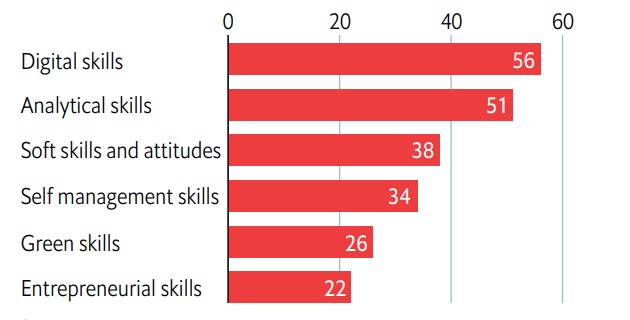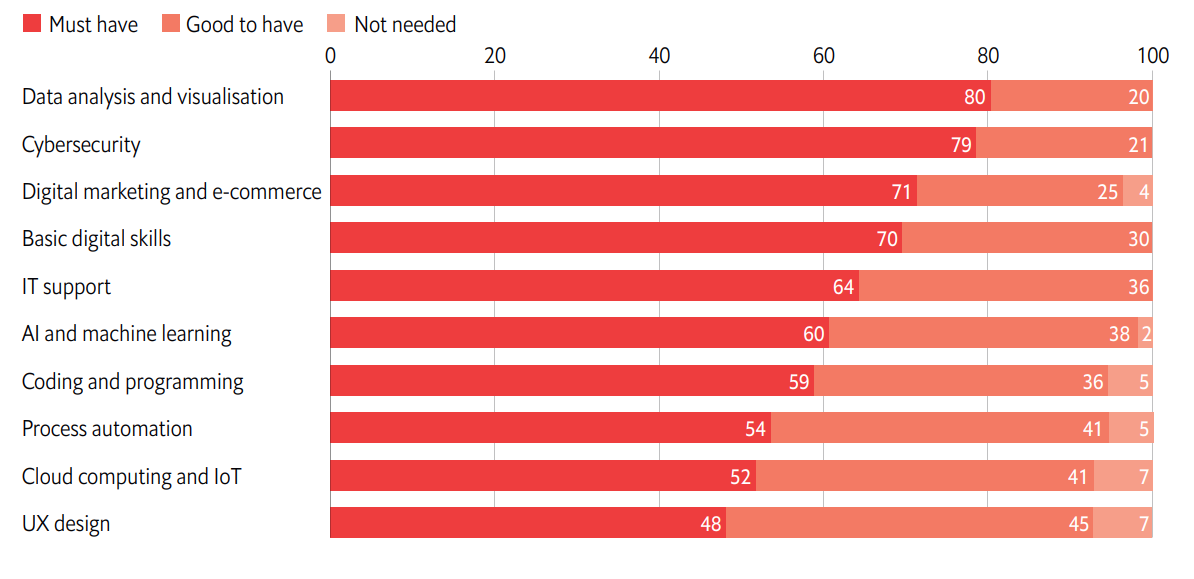The survey respondents were drawn from across 14 markets in the region, out of which 11.8% were Gen Z (born in 1997-2012), 63.2% were Millennials (1981-96) and 25% were Gen X (1965-80). They all work in a diverse mix of industries.
The research shows that, across the region, common understanding is lacking between employers and employees about future skills and the best ways to develop them. In some instances, there is also an expectation mismatch between what employers want and what employees see as being important. Understanding these gaps will be instrumental in creating a workforce that is prepared for the economy of the future.
This article—one in a series of 12 market reports—examines these issues in Thailand. This series complements a research paper that looks at the reskilling and upskilling imperative across APAC.
Key findings
- Digital skills (56%) are considered the most important skills category for Thai employees, closely followed by analytical skills (51%). Within the broad category of digital skills, advanced capabilities such as data analysis and visualisation (80.4%), cybersecurity (78.6%) and digital marketing (71.4%) are highly prioritised by workers. Respondents were almost twice as likely (60.7%) to prioritise artificial intelligence (AI) and machine learning (ML) skills than the Asia-Pacific (APAC) average (32.8%).
- Employees’ motivations to acquire digital skills are driven by the availability of free online courses (29%) and to perform better in their current roles (28%).
- While employees primarily consider employers key to their upskilling needs such as providing financial incentives for skilling and providing notable recognition (52% each), over half (58%) feel that the government has a key role in making them aware about future skills and trends.
Thailand has transitioned from a low to an upper-middle-income country over the past four decades, significantly reducing poverty rates and creating millions of jobs within a generation.1 The country is now looking to transition to a digital economy to enable greater productivity and innovation—and there are signs it is already on this path. In 2020 the European Centre for Digital Competitiveness ranked Thailand as the second-most digitally competitive country in East Asia and the Pacific.2 In addition, digital transformation is expected to add US$79.5bn annually by 2030 to Thailand’s economy.3
Preparedness of the labour market will be a key factor in achieving success from this digitalisation. Between 2010 and 2020, the value of Thailand’s digital services sector expanded by 37%, but the number of digital workers only rose by 26%.4 The absence of the corresponding tech skills to meet the demand driven by this digital transformation will limit businesses’ ability to digitally grow and transform.5 These shortages are particularly apparent in advanced technologies such as AI and data science.6
A strong focus on advanced digital skills
According to the Economist Impact survey, 56% of Thai employees consider digital expertise the most important category of skills that a worker should acquire today, broadly in line with regional trends. Thailand is an outlier in terms of what digital skills are considered priorities. While employees in most APAC markets rank basic digital skills as their top “must-haves”, employees in Thailand show a greater preference for advanced skills such as data analysis and visualisation (80.4%), cybersecurity (78.6%), and digital marketing and e-commerce (71.4%). A majority of employees (60.7%) also consider AI and ML skills as must-haves, almost double the regional average (32.8%).
These findings align with recent research that reveals that 96% of employers are hiring for roles involving advanced digital skills in order to meet their digital transformation plans.7 This growth in demand has also led to sharp rises in salaries for employees with these skills in the country, with a particular premium for digital marketing professionals.8
Figure 1: Digital and analytical skills are top priorities for Thai employees
Which skill categories do you think are the most important for the workforce in your sector to acquire today? (% of respondents)

Source: Economist Impact, 2023
Experts suggest that the focus on advanced digital skills is likely to be driven by the rapid digitalisation of business operations during and in the aftermath of the covid-19 pandemic. More than half of companies in Thailand in a 2022 Deloitte survey had adopted digital technologies, compared with only 12% pre-pandemic, making advanced digital skills top-of-mind among company leaders and employees.
Figure 2: Data analysis, cybersecurity and digital marketing trump basic digital skills
Which specific types of digital skills are must have, good to have or not needed for the workforce in your sector today? (% of respondents)

Source: Economist Impact, 2023
As the country continues to move online, cybersecurity capabilities will ensure the essential safeguard for its digital infrastructure. This is especially pertinent since cyber threats have jumped globally since the pandemic, and Thailand is no exception. The country experienced a sixfold increase in cyber-attacks between 2021 and 2022.9 Reflecting this, eight in ten (78.6%) employees in our survey consider cybersecurity as a must-have skill. As the businesses continue to digitalise, they will be increasingly vulnerable to these threats, and cybersecurity skills would be key to protecting sensitive information and reduce risks from these online threats.
Other areas considered important by more than half of employees in the survey include analytical skills such as problem solving, project management and critical thinking. Thailand’s workers defy regional trends in terms of the value they place on green skills (26% vs 17.7%). This could be attributed to a new environmental, social and governance reporting mandate for public companies issued by the national securities regulator. 10 The country is also vulnerable to the impacts of climate change. As such, green skills, such as sustainability reporting, sustainable business management and supply chain management, as reported by our survey respondents, will become more important in meeting Thailand’s future climate goals.11
Motivations and barriers to skilling
Employees in Thailand are mostly driven to acquire digital skills due to the availability of free online courses (29%), followed by the ability to perform better in their current job roles (28%). One in four also consider these skills as fundamental to enabling personal and professional progress.
Despite these motivations, employees face upskilling challenges. A lack of time is the biggest barrier to acquiring digital (34%) and analytical (33%) skills. A 2021 study assessing work-life balance in cities ranked Bangkok as the third-most overworked city globally, with nearly 20% of its population working more than 48 hours per week.12
Other barriers to learning new digital skills include the lack of opportunities to practice these skills (29%) and poor internet access (25%) to join the courses. Even with a strong focus on the digitalisation of businesses, nearly a quarter of the population still lacks access to basic internet services.13 And while nearly a third of respondents say that free online courses motivate them, a quarter claim that their high cost (25%) inhibits learning.
A collaborative approach to support employees’ upskilling
Both employers and the government are instrumental in addressing the multiple barriers to upskilling that employees face and play a crucial role in addressing an information gap that is resulting in skills blind spots.
The vast majority (79%) of respondents said that they have a poor understanding of what skills are needed in the market. Identifying future skills is complex, and keeping up with the most relevant market trends is likely to be challenging for most employees.14 Nearly half of employees consider their employers responsible for providing information on the skills that are needed for different job roles.
To help remedy this, employers and the government could map the current and future skills in demand, and communicate this information to the workforce, with options of different upskilling pathways. Second, vested stakeholders like businesses should try to incentivise learning on the job to help retain talent and plug skills gaps. Survey respondents consider employers important across every category ranging from providing financial incentives (52%), and notable recognition through certification (52%) for skilling.
Figure 3: Thai employees expect the most from their employers
In your opinion, who is responsible for supporting employees regarding the following issues? (% of respondents)

Source: Economist Impact, 2023
Three in ten employees (29%) consider the government responsible for providing access to diversified skilling programmes. To do this, policymakers could collaborate with different stakeholders across the skills ecosystem such as universities and businesses. This could also help provide the notable recognition that survey respondents say would help motivate further learning. “Push from the government can persuade universities to collaborate and align with industry needs,” says Agapol Na Songkhla, chief people officer at Thai Beverage. One example is the partnership between King Mongkut University of Technology Thonburi with the private sector to offer courses on 5G ICT skills, in line with the government’s efforts to ramp up its smart city development.15
As Thailand’s economy becomes digitally competitive, there is an urgent need for employees to acquire advanced digital skills. At present, employees expect their employers to support the majority of their reskilling needs. However, the government also plays a key role with more than half (58%) of employees relying on government awareness programmes to gain information on future skills. Government subsidies to cushion the cost to both businesses and their workers could help drive attention towards priority skills at any given time. In turn, this can give momentum to national efforts to focus on particular development and economic growth needs.
2 https://digital-competitiveness.eu/wp-content/uploads/ESCP03_Digital-Riser-Ranking_2020-09-14-1.pdf
3 Ibid.
4 https://www.thestar.com.my/aseanplus/aseanplus-news/2022/09/27/thailands-digital-firms-hire-vietnamese-to-fill-skills-gap-in-workforce
7 https://www.wtwco.com/en-th/insights/2023/02/wtw-reveals-thailands-job-outlook-for-2023-and-ways-to-retain-digital-talent-the-profession
8 Ibid.
11 https://documents1.worldbank.org/curated/en/468721645451588595/pdf/Creating-Markets-in-Thailand-Rebooting-Productivity-for-Resilient-Growth.pdf








